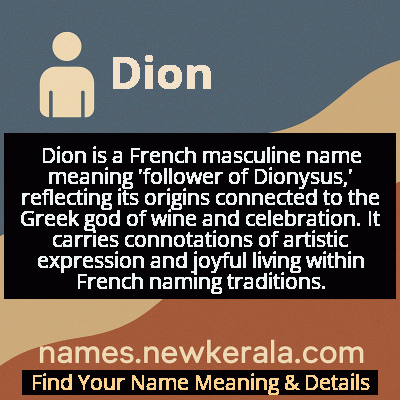Dion Name Meaning & Details
Origin, Popularity, Numerology Analysis & Name Meaning of Dion
Discover the origin, meaning, and cultural significance of the name DION. Delve into its historical roots and explore the lasting impact it has had on communities and traditions.
Name
Dion
Gender
Male
Origin
French
Lucky Number
6
Meaning of the Name - Dion
Dion is a French masculine name meaning 'follower of Dionysus,' reflecting its origins connected to the Greek god of wine and celebration. It carries connotations of artistic expression and joyful living within French naming traditions.
Dion - Complete Numerology Analysis
Your Numerology Number
Based on Pythagorean Numerology System
Ruling Planet
Venus
Positive Nature
Harmonious, responsible, caring, and artistic.
Negative Traits
Overly idealistic, superficial, possessive, or jealous.
Lucky Colours
Pink, turquoise.
Lucky Days
Friday.
Lucky Stones
Diamond, turquoise.
Harmony Numbers
2, 3, 9.
Best Suited Professions
Artists, musicians, teachers, healthcare workers.
What People Like About You
Warmth, nurturing nature, artistic flair.
Famous People Named Dion
Dion Boucicault
Playwright and Actor
One of the most prolific and successful playwrights of the Victorian era
Dion DiMucci
Singer-Songwriter
Rock and roll pioneer known for hits like 'Runaround Sue' and inducted into Rock and Roll Hall of Fame
Dion Dublin
Footballer and TV Presenter
Premier League striker who played for Manchester United and later became a BBC football presenter
Dion Phaneuf
Ice Hockey Player
NHL defenseman who served as captain of the Toronto Maple Leafs and was a three-time NHL All-Star
Name Variations & International Equivalents
Click on blue names to explore their detailed meanings. Gray names with will be available soon.
Cultural & Historical Significance
The name's journey through history reflects broader cultural exchanges between Greek, Roman, and French civilizations. During the Renaissance, when classical names experienced a revival, Dion gained popularity among educated classes who appreciated its classical roots. In modern times, the name has maintained its artistic associations while adapting to contemporary naming trends, representing a bridge between ancient cultural heritage and modern French identity. The name's evolution demonstrates how classical influences were absorbed and transformed within French naming traditions, creating a distinctive identity that honors both ancient roots and modern sensibilities.
Extended Personality Analysis
Individuals named Dion are often perceived as charismatic, creative, and socially adept, reflecting the name's origins connected to Dionysus, the god of celebration and artistic expression. They tend to possess natural leadership qualities combined with a warm, approachable demeanor that draws people to them. Dions are frequently described as having excellent communication skills and the ability to inspire others, making them effective in social and professional settings where persuasion and connection are valuable.
These individuals often exhibit a balanced personality that combines intellectual depth with emotional intelligence. They're typically adaptable and resourceful, able to navigate various social situations with grace and confidence. While they enjoy social interaction and celebration, many Dions also demonstrate strong analytical abilities and creative problem-solving skills. Their inherent charm and diplomatic nature often make them successful in careers involving public relations, arts, leadership, or any field requiring interpersonal finesse. The name suggests someone who can bridge different social groups and bring people together through their natural warmth and understanding.
Modern Usage & Popularity
In contemporary times, Dion remains a stylish but relatively uncommon choice in French-speaking regions and beyond, offering parents a name that is both classic and distinctive. While it never reached the massive popularity of some traditional French names, it maintains steady usage among families seeking names with cultural depth and international appeal. The name has seen particular favor among parents interested in mythology, arts, and names that work well in multiple languages. Recent naming trends show increased interest in shorter, punchier names with classical roots, positioning Dion well for potential growth. Its usage spans various social classes and regions, though it remains more common in urban than rural areas, and it continues to be appreciated for its sophisticated European flair without being overly common.
Symbolic & Spiritual Meanings
Symbolically, Dion represents creativity, celebration, and the transformative power of art and community. Drawing from its Dionysian roots, the name carries connotations of vitality, passion, and the breaking of conventional boundaries. It symbolizes the balance between structured civilization and natural, ecstatic expression—much like Dionysus himself bridged the gap between human society and wild nature. The name also embodies resilience and adaptation, having evolved from ancient Greek through Roman and French cultures while maintaining its core identity. In a broader sense, Dion represents the enduring human need for artistic expression, social connection, and the celebration of life's richness, serving as a reminder of the importance of joy, creativity, and community in human experience.

